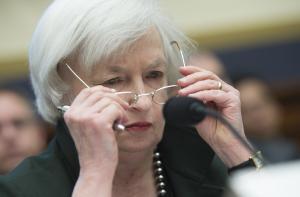WASHINGTON, Sept. 17 (UPI) — The U.S. central bank has decided that now is not the time to raise interest rates for the first time in nearly a decade.
At a two-day policy meeting Wednesday and Thursday, the Federal Reserve decided against boosting the rates — instead opting to keep them between zero and a quarter of a percent, signaling that it believes the economy is not yet at a robust enough level to warrant raising the rates.
Some analysts expected the Fed to finally raise the rates because several economic indicators are near levels that would allow the markets to withstand such an increase.
Thursday, though, nine of the 10 voting members disagreed.
“To support continued progress toward maximum employment and price stability, the Committee today reaffirmed its view that the current 0 to 1/4 percent target range for the federal funds rate remains appropriate,” the Federal Reserve said in a news release. “The Committee anticipates that it will be appropriate to raise the target range for the federal funds rate when it has seen some further improvement in the labor market and is reasonably confident that inflation will move back to its 2 percent objective over the medium term.”
The Federal Reserve noted, in particular, potential market troubles resulting from developments overseas.
“Recent global economic and financial developments may restrain economic activity somewhat and are likely to put further downward pressure on inflation in the near term,” it said.
Unsurprisingly, Richmond Fed President Jeffrey Lacker disagreed with the decision to leave rates unchanged. He has long expressed his belief that market conditions are able to withstand a rate hike. He was the only voting member who opposed leaving the rates alone.
The Fed itself and analysts do anticipate, though, that at least one rate hike will occur before the end of the year, once the inflation rate reaches the 2 percent target and the global climate stabilizes.
“When the Committee decides to begin to remove policy accommodation, it will take a balanced approach consistent with its longer-run goals of maximum employment and inflation of 2 percent,” the release said.
The Federal Reserve, however, noted that it’s possible that rates could remain beneath “normal” levels even once employment and inflation numbers stabilize.
“The Committee currently anticipates that, even after employment and inflation are near mandate-consistent levels, economic conditions may, for some time, warrant keeping the target federal funds rate below levels the Committee views as normal in the longer run,” it said.
Some analysts believe that volatility in the domestic stock market and economic turmoil overseas, particularly in China, are the primary underlying currents that influenced Thursday’s decision.
Interest rates have remained near zero for nearly a decade. The last hike occurred in 2008 at the height of the financial crisis.
The Federal Reserve will again meet in October and December.

COMMENTS
Please let us know if you're having issues with commenting.